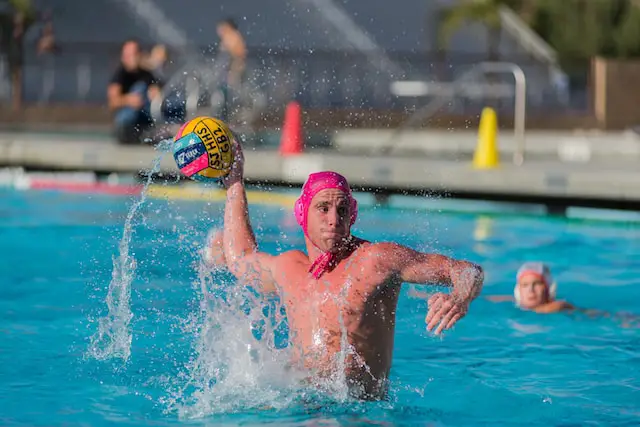Water polo is a sport that places significant physical demands on players and necessitates a distinctive combination of endurance, strength, and skill. It is frequently characterized as a blend of swimming, basketball, and wrestling and is played in a swimming pool with two teams consisting of seven players each.
Many people wonder if water polo is a difficult sport to play. The answer is yes, it is challenging, and it requires a lot of dedication and hard work to excel.
Players are required to swim considerable distances without experiencing fatigue, remain afloat in water for extended periods, and exhibit outstanding hand-eye coordination to accurately catch and throw the ball.
Additionally, they must be able to perform these skills while being pushed, pulled, and kicked by their opponents.
Rules and Skills
Water polo demands a great deal of physical exertion, necessitating a blend of swimming proficiency, stamina, strength, and dexterity.
The game is divided into four quarters, each lasting eight minutes, with a two-minute intermission separating them. In the event of a draw at the end of the scheduled duration, additional periods of play may be required to determine the victor.
The game is played under strict rules that are enforced by referees, and players can be excluded or penalized for various violations, such as holding, kicking, or pulling an opponent.
To be successful in water polo, players need to have a variety of skills, including swimming, passing, shooting, and defending.
Swimming is a critical skill, as players must be able to move quickly and efficiently through the water to get into position to receive the ball or defend against the opposing team. Passing is also essential, as the ball must be moved quickly and accurately to create scoring opportunities.
To shoot the ball into the goal from a distance, players must possess strength, accuracy, and precision, often under pressure from defenders.
Defending is also crucial, as players must be able to prevent the opposing team from scoring by blocking shots, stealing the ball, or intercepting passes.
Water polo is a challenging and thrilling sport that necessitates a blend of physical and mental abilities. Players must collaborate as a team, among other things communicate effectively, and make quick decisions under pressure to be successful. With dedication and practice, anyone can learn to play water polo and enjoy the thrill of this fast-paced and dynamic sport.
Physical Demands
Water polo demands a high degree of physical fitness and stamina from players. Among other things, players must be able to swim quickly and efficiently, as well as tread water for extended periods of time.
In addition to swimming, players must also be able to pass, shoot, and defend while treading water. This requires a great deal of upper body strength and core stability.
Players also need to be able to handle contact and physical play, as water polo is a contact sport. This means players may be pushed, grabbed, and even dunked underwater during play.
Overall, water polo requires a combination of speed, strength, endurance, and skill. It is a challenging sport that can be physically and mentally exhausting, but also incredibly rewarding for those who are up to the challenge.
Mental Toughness
Water polo necessitates a significant degree of mental fortitude. Players need to be able to stay focused, remain calm under pressure, and make quick decisions in a fast-paced environment.
Mental toughness is essential for success in water polo, as it allows players to push through physical exhaustion and maintain their performance at a high level.
One of the most important aspects of mental toughness in water polo is the ability to stay focused. With so much happening in the pool at any given moment, it can be easy to become distracted or overwhelmed. However, successful water polo players are able to block out distractions and maintain their focus on the game.
In addition to focus, mental toughness also involves the ability to remain calm under pressure. Water polo is a high-pressure sport, with players constantly facing challenges and obstacles.
Whether it’s defending against a strong opposing team or trying to score in a tight game, players need to be able to stay calm and composed in order to make smart decisions and execute their game plan.
Finally, mental toughness in water polo requires the ability to make quick decisions. With the fast pace of the game, players need to be able to think on their feet and make split-second decisions. This requires a high level of mental agility and the ability to quickly process information and react accordingly.
Overall, mental toughness is a crucial component of success in water polo. Players who are able to stay focused, remain calm under pressure, and make quick decisions are more likely to excel in the sport and achieve their goals.
Conclusion
To sum up, water polo is a demanding sport that necessitates a considerable amount of proficiency, stamina, and cooperation. While it may seem intimidating to newcomers, it is a sport that can be enjoyed by individuals of all ages and skill levels.
From the physical demands of treading water for extended periods of time to the strategic elements of the game, water polo requires a well-rounded athlete who is both mentally and physically prepared to compete.
However, with proper training and dedication, anyone can learn to play water polo and improve their skills over time. Whether you are looking to compete at a high level or simply enjoy the sport as a recreational activity, water polo offers a unique and exciting experience that is unlike any other.







